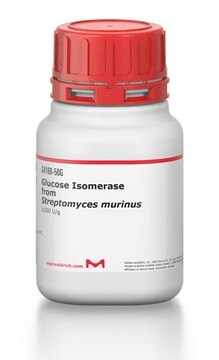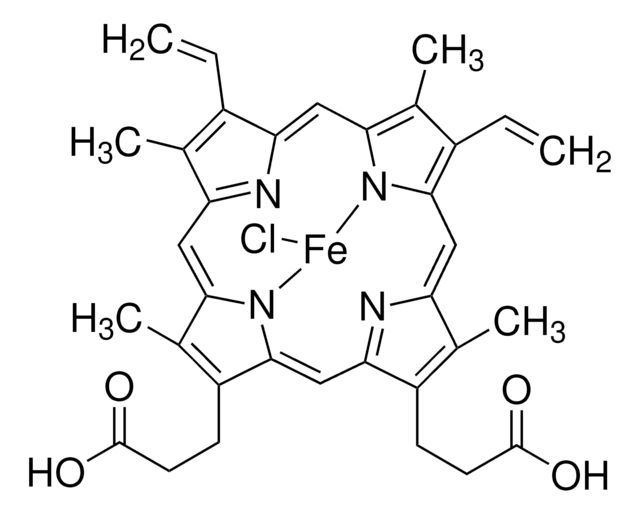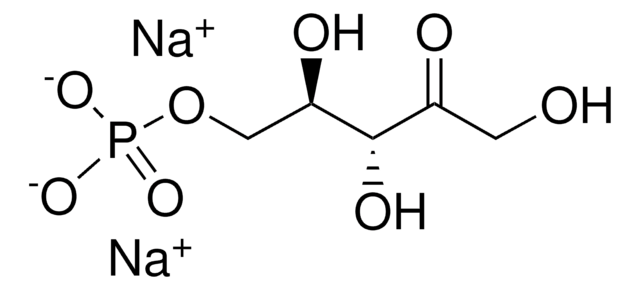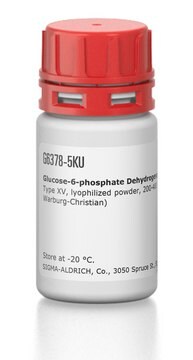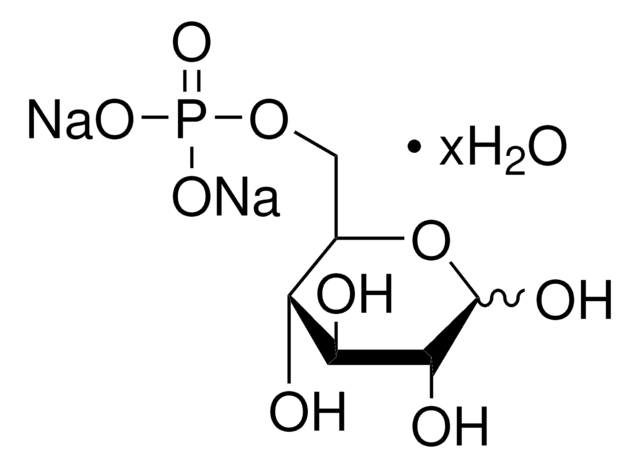SAE0005
Glucose-6-phosphate Isomerase human
recombinant, expressed in E. coli
Sinonimo/i:
GPI, PGI
Autenticatiper visualizzare i prezzi riservati alla tua organizzazione & contrattuali
About This Item
Prodotti consigliati
Ricombinante
expressed in E. coli
Livello qualitativo
Saggio
≥95% (SDS-PAGE)
Attività specifica
≥200 units/mg protein
Temperatura di conservazione
−20°C
Categorie correlate
Azioni biochim/fisiol
Glucose-6-phosphate isomerase (GPI) is a homodimeric enzyme ubiquitously present in most organisms. GPI catalyzes the interconversion between glucose-6-phosphate and fructose-6-hosphate, the second step of the glycolytic pathway. In mammals, Glucose-6-phosphate isomerase also acts as an autocrine motility factor (AMF), a neuroleukin, and a maturation factor. GPI deficiency is the second most common erythroenzymopathy of glycolytic enzymes after pyruvate kinase deficiency. Inherited deficiency of the enzymatic activity of GPI causes hereditary nonspherocytic hemolytic anemia (HNSHA) in humans, a severe deficiency that can be associated with hydrops fetalis (a-thalassaemia), immediate neonatal death, and neurological impairment.
Proprietà fisiche
C-terminal histidine-tagged
Definizione di unità
One unit will convert 1.0 mmole of D-fructose 6-phosphate to D-glucose 6-phosphate per inute at pH 7.4 at 25 °C.
Stato fisico
Supplied as a solution in 50 mM Tris-HCl pH 7.5, and 50% glycerol
Codice della classe di stoccaggio
10 - Combustible liquids
Classe di pericolosità dell'acqua (WGK)
WGK 1
Punto d’infiammabilità (°F)
Not applicable
Punto d’infiammabilità (°C)
Not applicable
Scegli una delle versioni più recenti:
Certificati d'analisi (COA)
Lot/Batch Number
Non trovi la versione di tuo interesse?
Se hai bisogno di una versione specifica, puoi cercare il certificato tramite il numero di lotto.
Possiedi già questo prodotto?
I documenti relativi ai prodotti acquistati recentemente sono disponibili nell’Archivio dei documenti.
Miao Xu et al.
Blood, 132(6), 622-634 (2018-05-26)
Thrombopoietin (TPO), a hematopoietic growth factor produced predominantly by the liver, is essential for thrombopoiesis. Prevailing theory posits that circulating TPO levels are maintained through its clearance by platelets and megakaryocytes via surface c-Mpl receptor internalization. Interestingly, we found a
Jose Maria Bastida et al.
Thrombosis and haemostasis, 117(1), 66-74 (2016-10-14)
Currently, molecular diagnosis of haemophilia A and B (HA and HB) highlights the excess risk-inhibitor development associated with specific mutations, and enables carrier testing of female relatives and prenatal or preimplantation genetic diagnosis. Molecular testing for HA also helps distinguish
Alice Fabarius et al.
Cancers, 14(12) (2022-06-25)
Soluble factors released from irradiated human mesenchymal stromal cells (MSC) may induce genetic instability in human CD34+ cells, potentially mediating hematologic disorders. Recently, we identified four key proteins in the secretome of X-ray-irradiated MSC, among them three endoplasmic reticulum proteins
Lee-Chun Su et al.
ACS nano, 8(10), 10826-10836 (2014-09-16)
The endothelium monolayer lining in the luminal side of blood vessels provides critical antithrombotic functions. Damage to these cells will expose a highly thrombogenic subendothelium, which leads to pathological vascular changes. Using combined tissue engineering and ligand-receptor targeting strategy, we
Yunmei Wang et al.
Nature communications, 8, 15559-15559 (2017-05-31)
Inflammation and thrombosis occur together in many diseases. The leukocyte integrin Mac-1 (also known as integrin α
Il team dei nostri ricercatori vanta grande esperienza in tutte le aree della ricerca quali Life Science, scienza dei materiali, sintesi chimica, cromatografia, discipline analitiche, ecc..
Contatta l'Assistenza Tecnica.